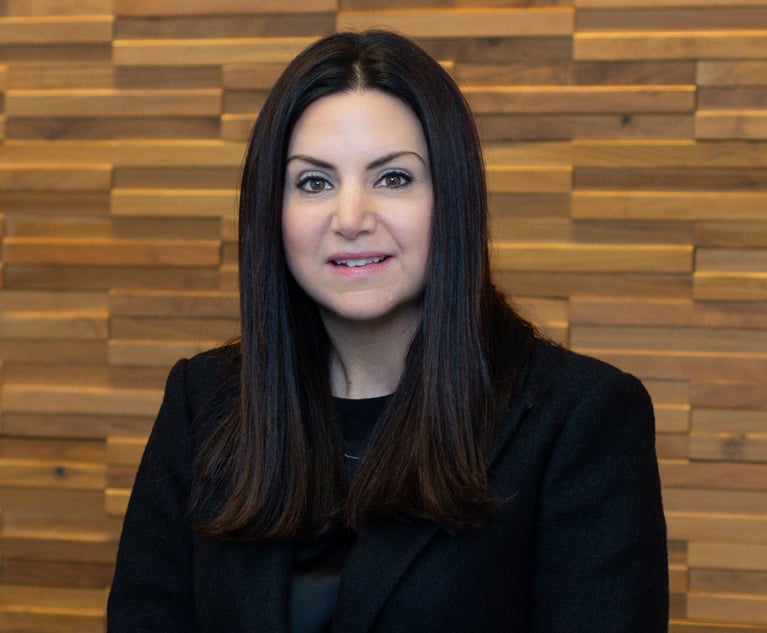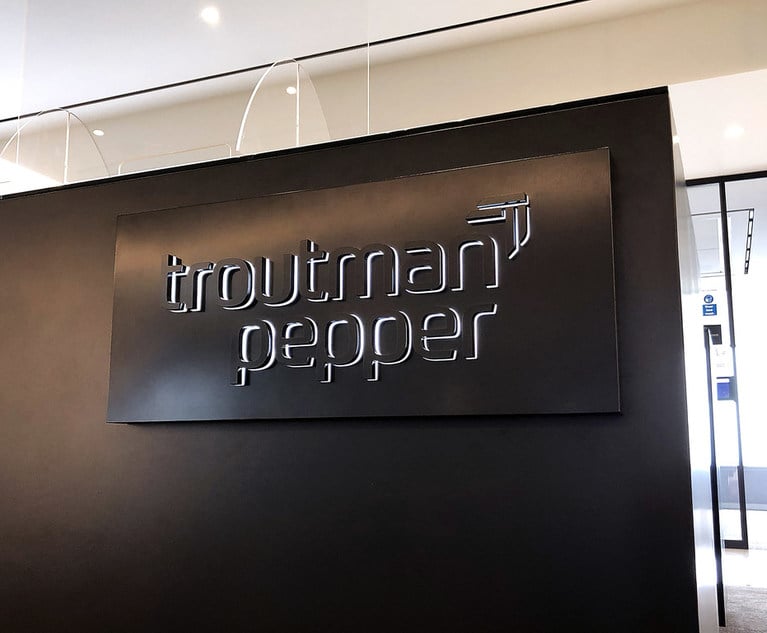Sex Trafficking Awareness Is Increasing and So Are Civil Claims
Court watchers said growing media attention has changed public understanding of sex trafficking, including the perception of women who were once seen as sex workers, now being recognized as victims.
July 22, 2019 at 02:11 PM
9 minute read
 Photo: Shutterstock
Photo: Shutterstock
Editor's note: This is the first article in a series.
When Colorado attorney Beth Klein brought her first civil case involving sex trafficking to trial more than 10 years ago, she was met with apathy from the jury and the case ended in a defense verdict.
“In our first trials, people were like, 'who cares. This is just a hooker who chose this,'” she said. “When I was talking about human trafficking back in 2007, they just thought it was weird.”
Klein, however, was testing legal theories that have slowly and steadily gained momentum over the past decade to the point where sex trafficking litigation—both criminal and civil—is routinely capturing national attention.
Most recently, financier Jeffrey Epstein is facing charges stemming from the alleged sex trafficking of minors, and, earlier this year, the prostitution sting at a massage parlor that netted the arrest of Super Bowl champion New England Patriots owner Robert Kraft was also widely reported to have possible connections to sex trafficking, although those allegations were later walked back.
Both of those cases involved high-profile criminal allegations, but on the civil side, lawyers from Philadelphia to Portland, Oregon, have filed high-profile lawsuits over alleged sex trafficking. Several suits have targeted hotels, claiming they looked the other way when victims were being trafficked on their properties. Facebook has also been sued for allegedly allowing the site to be used as a grooming tool for traffickers, and earlier this year a group of 50 women sued Salesforce for its role in supporting the website Backpage.com, which was a major hub of trafficking before it was seized by federal law enforcement agencies in 2018.
According to civil litigators, sex trafficking cases are difficult and can be fraught with setbacks, but the litigation is growing as attorneys are continuing to push novel claims in state and federal courts across the country. Changes have also been made to state and federal laws over the past 15 years to specifically open up these types of claims. But, according to attorneys who work in the field, a more wide-ranging change has taken hold allowing these cases to find success.
“There's an increasing awareness and compassion for people whose labor is exploited, or who've been used for sex services,” said Klein, who has gone on to win millions in judgments over sex trafficking claims. ”It took transformation, and compassion, for people to see this as a viable tort, or crime.”
Changing Laws and Minds
Klein, who is a partner at Boulder, Colorado, personal injury firm Klein Frank and a leading member of the Klein Frank Foundation, a group aimed at training on and spreading awareness of the issue, said she took an interest in human and sex trafficking cases as early as 1979. At that time, not only were there no laws on the books specifically targeting the practice, terms like “human trafficking,” or “sex trafficking” weren't in use.
“That language didn't really exist,” she said. “Human trafficking wasn't even a thing until the 1990s.”
The first big change occurred in 2000, when Congress passed the Trafficking Victims Protection Act, which, according to a recent report from the Human Trafficking Legal Center, was the first comprehensive U.S. law penalizing the full range of human trafficking offenses. The law targeted the ”recruitment, harboring, transportation, provision, obtaining, patronizing, or soliciting” a person for commercial sex, and defined traffickers as those using ”force, fraud or coercion.”
In 2003, Congress reauthorized the law, with an added provision that allowed for civil causes of action against traffickers, and then in 2008 the law was expanded to allow for civil claims against anyone involved in the entire list of trafficking-related offenses.
According to the Human Trafficking Legal Center's study, which focused on federal litigation, the number of civil suits over sex and labor trafficking has grown sharply over the past 15 years, growing from six cases filed in 2004 to 37 in 2017.
In the meantime, states also began passing laws targeting trafficking activities to varying degrees. In 2009, Texas, for example, passed laws allowing for civil claims against traffickers, and Colorado passed a law, in 2012, which Klein helped to write, that established civil claims for victims. In 2014, Pennsylvania passed its anti-trafficking law, which allows for treble damages if the conduct is determined to be willful. And earlier this year, the New York legislature expanded the statute of limitations for child victims of sex abuse and opened a one-year-long window starting in August for any victims to bring suit.
Court watchers said growing media attention has changed public understanding of sex trafficking, including the perception of women who were once seen as sex workers, now being recognized as victims.
Florida attorney Michael Dolce of Cohen Milstein Sellers & Toll, who leads the firm's sex trafficking and abuse practice, said the increased awareness also helped those being abused to understand that they have been the victim of trafficking.
“Many human trafficking victims are starting to come to the realization that they are victims,” Dolce said. “For a very long time we treated them as prostitutes. We kept them from recognizing that they're victims.”
Continued Growth
The first cases were brought against the traffickers themselves, who often ended up in prison and had little assets to recover, but lawsuits are now being lodged against a range of entities, including hotels, motels, taxis, massage parlors, truck stops and, in one case outlined in the Human Trafficking Legal Center's report, a doctor who prescribed drugs to a trafficker who then used those drugs to control a trafficking victim.
“As these states' laws have created civil causes of action for survivors of sex trafficking, we've seen a lot more litigation arise,” Shea Rhodes of the Villanova Law Institute to Address Commercial Sexual Exploitation said.
Suing third parties, she noted, is a way for attorneys to gain access to deeper pockets, but it has also helped to put pressure on entities to be vigilant in the fight against trafficking.
“The hotel industry is really getting up to speed,” Rhodes said. “They want to be our allies in the fight to stop trafficking.”
The federal statutes have also expanded even more recently with the Stop Enabling Sex Traffickers Act (SESTA) and Allow States and Victims to Fight Online Sex Trafficking Act (FOSTA), which were signed into law in 2018 with the goal of stripping immunities for online services provided for under the Communications Decency Act.
Rhodes said laws like this are increasingly necessary since “the internet is the new street corner.”
Anita Teekah, senior director on anti-trafficking programs at Safe Horizon, however, said she had concerns about pushing the boundaries of civil litigation too far.
“The limits of liability could become so nebulous, it might almost become meaningless in a way,” she said. “In theory, it's always better for victims to have more remedies under the law … but at the same time, it's a very nuanced crime, so I would want to make sure anyone engaged in civil litigation would very clearly know what they're doing.”
Attorneys said they have seen little litigation against those who purchase sex, but several said that suing patrons could be another avenue of recovery.
“As a general proposition, if someone is participating in human trafficking as a customer, then they are creating a victim. Without the customer there would be no traffickers,” Dolce said. “I would take that case.”
Tough Cases
Despite the growth, there are numerous obstacles for recovery, like incarcerated defendants and insurance indemnity clauses for third parties, so, according to attorneys who work in the field, oftentimes the lawsuits are aimed more at raising awareness, or stopping a chain of abuse, than obtaining a recovery.
Kline & Specter attorney Nadeem Bezar focuses on abuse litigation. In 2017, he sued a hotel for allegedly turning a blind eye to trafficking in what marked the first lawsuit brought under Pennsylvania's anti-trafficking law. Last year, a Philadelphia judge determined the hotel's insurance carriers would not have to cover the litigation.
“If people think the lack of insurance is going to be a deterrent to me, please think again. I'll find coverage, or we'll move into the hotel,” he said. “It's to bring awareness.”
Dolce also noted that trying these cases have their own challenges.
Oftentimes, defenses center around arguments that the victim was a willing participant working as a prostitute or a stripper, but Dolce said juries are increasingly receptive when they are given the fuller picture.
“I have confidence when I get in front of a jury that I'm going to be able to educate them, to pass that initial ingrained reaction. You tell the whole story,” he said. “These stories are tragic, but they reveal the truth. These young people are not in control of their lives.”
Damages can also be difficult to portray, he said.
“These injuries are psychic. Most predators don't leave a mark, so how do you show the grievousness of that injury?” Dolce said.
Dolce and Bezar both also stressed that the psychological trauma victims have endured further set trafficking cases apart from other types of torts, where sometimes there are safety concerns for the victims and even the process of litigating claims could re-traumatize the victims. They, and others, cautioned that this is not a practice attorneys should enter lightly.
“These are not easy things. It's a very dark side of human nature. It's a very upsetting fact patter, at best, and it lands you in a very difficult spot,” Bezar said.
The next article in the series will address managing the sensitive nature of bringing human trafficking lawsuits.
This content has been archived. It is available through our partners, LexisNexis® and Bloomberg Law.
To view this content, please continue to their sites.
Not a Lexis Subscriber?
Subscribe Now
Not a Bloomberg Law Subscriber?
Subscribe Now
NOT FOR REPRINT
© 2025 ALM Global, LLC, All Rights Reserved. Request academic re-use from www.copyright.com. All other uses, submit a request to [email protected]. For more information visit Asset & Logo Licensing.
You Might Like
View All

Troutman Pepper Says Ex-Associate Who Alleged Racial Discrimination Lost Job Because of Failure to Improve
6 minute read
Over 700 Residents Near 2023 Derailment Sue Norfolk for More Damages
3 minute readTrending Stories
- 1Public Notices/Calendars
- 2Wednesday Newspaper
- 3Decision of the Day: Qui Tam Relators Do Not Plausibly Claim Firm Avoided Tax Obligations Through Visa Applications, Circuit Finds
- 4Judicial Ethics Opinion 24-116
- 5Big Law Firms Sheppard Mullin, Morgan Lewis and Baker Botts Add Partners in Houston
Who Got The Work
J. Brugh Lower of Gibbons has entered an appearance for industrial equipment supplier Devco Corporation in a pending trademark infringement lawsuit. The suit, accusing the defendant of selling knock-off Graco products, was filed Dec. 18 in New Jersey District Court by Rivkin Radler on behalf of Graco Inc. and Graco Minnesota. The case, assigned to U.S. District Judge Zahid N. Quraishi, is 3:24-cv-11294, Graco Inc. et al v. Devco Corporation.
Who Got The Work
Rebecca Maller-Stein and Kent A. Yalowitz of Arnold & Porter Kaye Scholer have entered their appearances for Hanaco Venture Capital and its executives, Lior Prosor and David Frankel, in a pending securities lawsuit. The action, filed on Dec. 24 in New York Southern District Court by Zell, Aron & Co. on behalf of Goldeneye Advisors, accuses the defendants of negligently and fraudulently managing the plaintiff's $1 million investment. The case, assigned to U.S. District Judge Vernon S. Broderick, is 1:24-cv-09918, Goldeneye Advisors, LLC v. Hanaco Venture Capital, Ltd. et al.
Who Got The Work
Attorneys from A&O Shearman has stepped in as defense counsel for Toronto-Dominion Bank and other defendants in a pending securities class action. The suit, filed Dec. 11 in New York Southern District Court by Bleichmar Fonti & Auld, accuses the defendants of concealing the bank's 'pervasive' deficiencies in regards to its compliance with the Bank Secrecy Act and the quality of its anti-money laundering controls. The case, assigned to U.S. District Judge Arun Subramanian, is 1:24-cv-09445, Gonzalez v. The Toronto-Dominion Bank et al.
Who Got The Work
Crown Castle International, a Pennsylvania company providing shared communications infrastructure, has turned to Luke D. Wolf of Gordon Rees Scully Mansukhani to fend off a pending breach-of-contract lawsuit. The court action, filed Nov. 25 in Michigan Eastern District Court by Hooper Hathaway PC on behalf of The Town Residences LLC, accuses Crown Castle of failing to transfer approximately $30,000 in utility payments from T-Mobile in breach of a roof-top lease and assignment agreement. The case, assigned to U.S. District Judge Susan K. Declercq, is 2:24-cv-13131, The Town Residences LLC v. T-Mobile US, Inc. et al.
Who Got The Work
Wilfred P. Coronato and Daniel M. Schwartz of McCarter & English have stepped in as defense counsel to Electrolux Home Products Inc. in a pending product liability lawsuit. The court action, filed Nov. 26 in New York Eastern District Court by Poulos Lopiccolo PC and Nagel Rice LLP on behalf of David Stern, alleges that the defendant's refrigerators’ drawers and shelving repeatedly break and fall apart within months after purchase. The case, assigned to U.S. District Judge Joan M. Azrack, is 2:24-cv-08204, Stern v. Electrolux Home Products, Inc.
Featured Firms
Law Offices of Gary Martin Hays & Associates, P.C.
(470) 294-1674
Law Offices of Mark E. Salomone
(857) 444-6468
Smith & Hassler
(713) 739-1250






